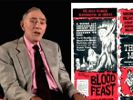Eye For Film >> Movies >> Herschell Gordon Lewis: The Godfather Of Gore (2010) Film Review
To those with a love of exploitation cinema, there are few filmmakers greater that Herschell Gordon Lewis. To others, if they have heard of him at all, he is merely a footnote in the history of cinema, a dabbler who made poor quality zero-budget Z-movies and had nothing artistic to contribute. It's saying something to note that people in both camps will love this documentary. It's fun, it's inspiring, and whoever you are, you'll end up learning something new.
At the centre of it is Herschell himself. Few film directors have as much onscreen presence. With his deadpan delivery, his acutely judged self-deprecation and his scandalous sense of humour, he's immensely entertaining in his own right, and provides most of the film's best lines. There's also commentary from John Waters, witty as ever, and from most of the major players in Herschell's films, including his long term co-producer David Friedman and actors like Mal Arnold and Jerome Eden ("He called himself Jerome Stallion, but I happened to know that was not his real name"). In this erudite if not exactly salubrious company we travel through the full story of Herschell's work.

A former schoolteacher and sometime radio station manager, Herschell got into movies at the end of the Fifties, a time when censorship was very much the norm and anything remotely racy could result in cinemas being raided. Inspired by Russ Meyer's discovery that the censors considered nudity acceptable if it wasn't presented in a sexual context, he invested in a film called The Adventures Of Lucky Pierre, about an everyday working class guy who repeatedly finds himself in the presence of frolicking topless women. The film's success exceeded his wildest expectations. It led to a string of what were known as 'nudie cutie' films, involving various far fetched scenarios whereby women would perform everyday activities semi-naked, and it made his film company a great success. In due course, when the excitement over these films began to fade, he set out to establish what the next big thing would be - what would offend America's moral sensibilities as much as these films had? The answer could be summed up in a single word: gore.
All this, fans will already know, but the journey is beautifully illustrated, and there are clips here from lost material that has never been seen before. For the newcomer it may prove something of an eye-opener (or, indeed, an eye-popper), as it places Herschell's work in its proper socio-political context. In a sense he was pursuing the American dream - life, liberty, and the pursuit of happiness - but he faced a constant struggle to get away with it. That he did so reveals a level of inventiveness one wouldn't guess at from watching the films themselves; it's no surprise to discover that he's a marketing guru today. He was also, of necessity, a resilient character, powered by a great sense of fun, and that spirit oozes from every pore of this film, making for a wonderfully positive viewing experience.
If there is a weakness to this film, it's that it's rather too long, and later scenes don't always have the impact of the early ones; but there's so much good material here that it would be difficult to know what to cut. Each of Herschell's most famous films gets a mention, from Daughter Of The Sun to the seminal Blood Feast and the classic Two Thousand Maniacs. In places the director apologises to viewers who had to sit through his weaker efforts. This film provides a distilled selection of highlights, with behind-the-scenes stories every bit as entertaining as the scenes themselves. Comparisons with Meyer are rather slender and seem to miss the point a bit - we're told Herschell's female stars were sexier, but they were presented as more sexually available, in contrast to his rival's domineering vixens - yet this is balanced by clips from She-Devils On Wheels, which rivals Chopper Chicks In Zombie Town as the greatest all woman biker gang movie out there.
Finally, we get a revealing glimpse into the director's private life. His elegant apartment, with its polished wooden floors and oriental sculptures, couldn't be more at odds with the cheep and cheerful character of his work. In its sly way, this film presents a revealing portrait of a man with very precise control over his own image. It's a great contribution to the history of cinema and any exploitation afficionado would be poorer for missing it.
Reviewed on: 25 Oct 2010
















